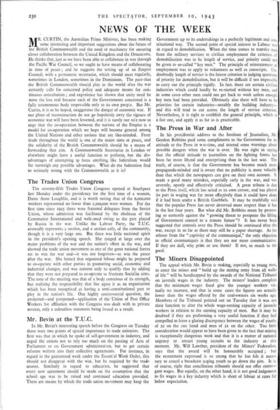The.Press in War and After
In his presidential address to the Institute of Journalists, Mr. Gordon Robbins paid some compliments to the Government for its attitude to the Press in war-time, and uttered some warnings about possible dangers when the war is over. He was right in saying that the official attitude to journalists on the fighting fronts has been far more lib.ral and enterprising than in• the last war. The truth, of course, is that the Government has become much more propaganda-minded and is aware that no publicity is more valuable than that which the newspapers can give on their own account. It made a good many mistakes, especially early in the war, and was severely, openly and effectively criticised. A great tribute is due to the Press itself, which has acted as its own censor, and'has played its part in waging war far more effectively than it could have done if it had been under a British Goebbels. It may be truthfully said that the popular Press has never deserved more respect than it has in the last four years. But what did Mr. Robbins mean by protest- ing so earnestly against the " growing threat to postpone the lifting of Government control to a remote future "? It has never been suggested that controls over the Press should be continued after the war, except in so far as there may still be a paper shortage. As for release from the "captivity of the communiqué," the only objection to official communiqués is that they are not more communicative. If they are dull, why print or use them? If not, so much to the good.


























 Previous page
Previous page